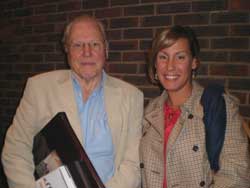 On Monday, 12 October 2009, Sir David Attenborough participated in the Cambridge University Personal-Histories in Archaeology project. I was there, along with a capacity crowd of over 700 guests, to listen to one of television’s great pioneers.
On Monday, 12 October 2009, Sir David Attenborough participated in the Cambridge University Personal-Histories in Archaeology project. I was there, along with a capacity crowd of over 700 guests, to listen to one of television’s great pioneers.
Though Sir David Attenborough is perhaps best known and loved for his work on natural history programmes, he was invited by the Personal-Histories project to discuss the early years of his career as Assistant Producer on the historic and influential archaeological programme Animal, Vegetable, Mineral, and to share his vivid memories of Glyn Daniel, Mortimer Wheeler and the making of Buried Treasure, Chronicle and the original Silbury Hill programmes.
As a speaker, Attenborough was lively, warm and engaging. His talk was perfectly pitched for an audience who wanted to hear about what it was like to be involved in some of the very first efforts to popularise archaeology. Certainly, his anecdotes about Sir Mortimer Wheeler’s calculated moustache-twirling, Margaret Mead’s grumpy recalcitrance and a canny director’s method of intentionally antagonising Colin Renfrew in order to extract a passionate performance from him had everyone in stitches, most especially because Renfrew himself was in the audience, laughing along with us.
Attenborough was joined by a panel of his colleagues from the early days at the BBC: David Collison, Anna Benson Gyles and Ray Sutcliffe, who were all key members of the teams who worked on the archaeology shows. The four speakers combined to paint a very nostalgic picture of television in the good old days, before the number-crunchers and the suits took over, when one could easily find oneself atop Silbury Hill with a newfangled hand-held camera, praying that when the television cameras started to roll, something fantastic would happen. Programming back then started with a fascinating subject, and then it was worked out how to film it; rather than now, when it is so obviously the end result that takes precedence that even professional sports events are paused for commercial breaks. The specific example of the Silbury Hill programmes was tabled. In the 1969 version, the archaeology was not informed by the fact that it was going to be televised. In contrast to this, the recent programme utilised every TV trick in the book. What was more important — Neil Oliver’s hair, or the archaeology? It wasn’t clear; which led David Collison, Director of the first Silbury Hill broadcasts, to comment that there is currently a dearth of good, solid ideas in all fact-based programming, a direct result of public ‘over-choicing’ which leads to the struggle to attract viewers, which creates the need for gimmicks, which dumbs-down the programmes, and so forth.
A special treat were the episodes of Animal, Vegetable, Mineral that were screened before the talk. It was enthralling to watch the giants of my archaeological education interact with the objects, each other, and the world beyond the lens. An audience member asked Sir David whether he thought Animal, Vegetable, Mineral would be as popular in today’s world; the question was collectively answered by the panel as a resounding ‘no’. Today’s zeitgeist doesn’t allow for programmes like AVM anymore; ratings success is based on immediate gratification — in our disposable culture, who would have the patience to spend an hour watching such harmless good fun? Time Team is a perfect example of how the medium has become the message; though it is an immensely entertaining programme and has been very successful, Time Team is archaeology as designed for public consumption. This is the ultimate challenge for communicating archaeology in the years to come: if archaeology is a brand, who’s buying? As a cacophony of Twitterings deafens the globe, will the very nature of the study of the past prevent it from being effectively and thrillingly presented to the public? I certainly hope not, and look forward to what is next in the future of the past.



